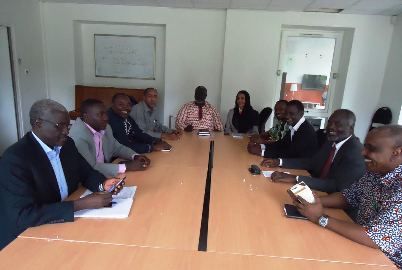Sharp differences over SRF presidency threaten unity of Sudanese rebels
October 18, 2015 (KHARTOUM) – A conflict erupted Sunday between the groups of the Sudanese Revolutionary Front (SRF) over the chairpersonship of the alliance, following their failure to reach an agreement on how to make the transfer of power.

Hajo further praised Malik Agar for chairing the rebel alliance since its establishment, and vowed that the group will strive to achieve its objectives for peace, democracy and equality in Sudan.
The statement which is released at the end of a five-day meeting in Paris didn’t mention the rumours circulating about sharp divisions within the alliance or the different positions on the transfer of leadership.
However, in reaction to the heated debates in the social media between the supporters and followers of the different SRF factions, the speaker of JEM’s legislative council, al-Tahir al-Faki, said in remarks Sunday the transfer of power to Ibrahim was constitutional and explained it was the decision of four groups.
“Four [SRF] factions have adhered to the constitutional right for the transfer of power and the other party [the opponents] has chosen not to abort the democratic transition…and therefore power has been transferred to Ibrahim because the four factions constitute a majority,” he further explained.
Al-Faki was referring to the Justice and Equality Movement (JEM), the two factions of the Sudan Liberation Movement led by Abdel Wahid al-Nur (SLM-AW) and Minni Minnawi (SLM-MM), and a faction of the Democratic Unionist Party led by al-Tom Hajo.
Last June, SRF factions had previously agreed that chairmanship of the organization must be turned to a rebel leader from Darfur.
However, differences among Darfur rebel movements prevented execution of that decision which led to the extension of Agar’s tenure until next June and also decided to modify the constitution of the alliance in order to allow the adoption of decisions by a supermajority of two-thirds and to abandon the current process which stipulate to decisions should be taken by consensus.
In September, JEM and SLM factions said they agreed to nominate Gibril Ibrahim for the chairmanship and demanded the immediate transfer to him, but the SPLM-N, head of the eastern Sudan opposition group, the United Popular Front for Liberation and Justice (UPFLJ), Zaineb Kabashi and a National Umma Party’s (NUP) faction led by Nasr al-Din al-Hadi al-Mahadi insisted on the need to achieve the reforms before.
During a meeting from 13 to 17 Octobers the two blocks failed to achieve reach an agreement as every side stuck to its position despite different proposals to break the deadlock.
AGAR CALLS TO PRESERVE UNITY
The SPLM-N leader for his part issued a statement on Sunday renouncing Hajo’s statement saying it has nothing to do with the SRF leadership council, pointing it has been issued after he left Paris.
He stressed they agreed to transfer the presidency to Ibrahim but there were differences on the scenario and timing of electing the new chairman.
“This statement represents a new qualitative development within the SRF as internal differences have been transferred outside the organizational frameworks by leading figures and this would exacerbates the polarization and tension at a time when we are in dire need for unity,” he added.
Agar called upon SRF members and allies to make every effort to strengthen the alliance and “help it avoid side battles that only benefit our opponents”.
He thanked the SRF allies including from the Sudanese political forces and the regional and international friends for efforts they made to maintain the unity of the alliance.
He added that SRF factions must seek to unite the civil and political forces to preserve the unity of the “Sudan Call” declaration, urging them to offer a unified vision to the meetings scheduled to convene under the auspices of the African Union High Implementation Panel (AUHIP) on November 2nd.
Agar further said he will meet with officials from the AUHIP, UN and other international parties in Addis Ababa on Sunday, pointing he will offer a unified vision which represents the entire opposition forces.
SRF groups signed in November 2011 a founding charter of their alliance in which they speak about the use of all means to topple the regime and to establish a democratic and secular state.
Also, they formed a joint military command and decided to carry out attacks everywhere in Sudan. But after a series of attacks in April and May 2013, differences emerged gradually within the military leadership of the alliance.
On the political front, the alliance however successfully concluded an alliance with the opposition parties and signed an agreement with the AUHIP, the DUP of Sadiq al-Mahdi and the dialogue committee in September 2014 paving the way for the adoption of a road map by the AU Peace and Security Council to facilitate a comprehensive solution in Sudan.
It is not clear if the SRF leaders will put aside their difference and work again together but the existing mediation framework and plans for peace in Sudan require their participation or collaboration to reach ceasefire agreements in Blue Nile, South Kordofan states and Darfur region.
(ST)
